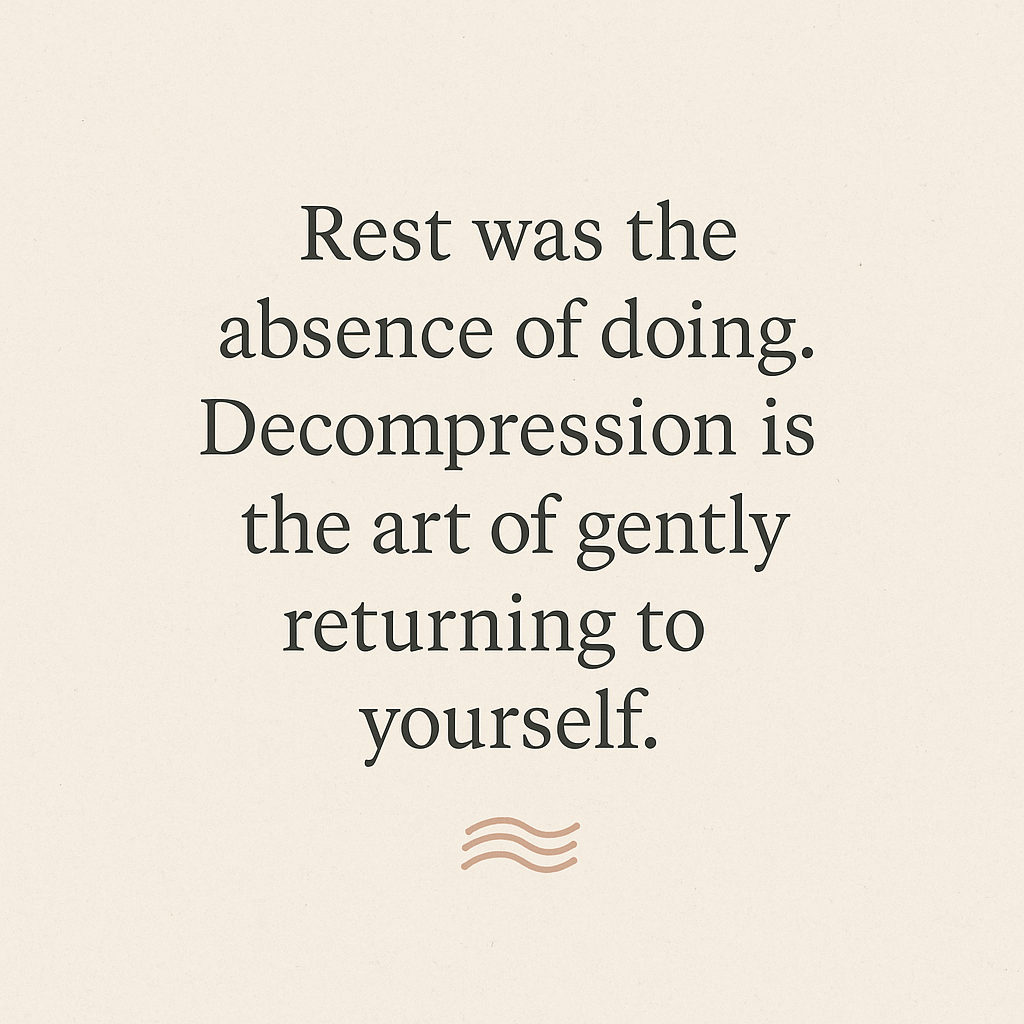Because recovery isn’t a luxury, it’s how you keep going without losing yourself.
I’ve been working and hustling since I was 19. I turned 41 last March. That’s over two decades of never really stepping off the wheel. Sure, I took days off. Maybe even a short vacation here and there. But even then, I never actually rested.
You know what I mean? The kind of rest where your body isn’t pretending to rest while your mind is still running like a processor in overdrive. The kind where your breath slows down without guilt whispering in the background.
I didn’t even know there was a word for it, decompression, until I was 37.
One evening, after another long day juggling roles and responsibilities, a colleague asked me:
“So how do you decompress after work?”
I thought he meant hobbies.
So I gave him a slightly awkward answer:
“Uhh… I love jigsaw puzzles, watching movies, sometimes I travel…”
He smiled gently and said,
“When I said decompress, I meant something you do to completely rest, to end your working day. To tell your mind it’s safe to stop now.”
That moment stayed with me.
Because I realized… I didn’t know how to stop. I only knew how to switch tasks. Finish one thing, jump into the next. Even my hobbies had checkboxes and goals. Even my “breaks” felt like transitions, not endings.
I thought I was resting. But I was only distracting myself from the noise, not releasing it.
What Decompression Really Means
Decompression isn’t the same as zoning out. It’s not something passive like scrolling your phone or binge-watching five episodes of a show and then wondering why you still feel tired.
It’s active rest.
A conscious choice to slow down your mind, not just your body.
It’s about closing loops, softening tension, and letting your nervous system know that it’s okay to let go now.
For years, I went to bed with a buzzing brain, still calculating the next day’s tasks, still replaying today’s mistakes. But when I started giving myself space to decompress before I called it a day, something shifted.
Some days, it looks like putting my phone down and having a nice hot coffee or matcha.
Some days, it’s journaling for five minutes.
Other days, it’s simply whispering to myself:
You’ve done enough for today. You’re allowed to rest now.
And that little act of intention made everything feel different.
5 Quiet Lessons I Learned About Decompression
- Decompression is not the same as distraction.
True decompression invites your mind to settle, not escape. It’s restorative, not numbing. - It’s a boundary, not a reward.
You don’t have to earn it by finishing everything. You get to set a line between work and rest simply because you’re human. - It’s essential for nervous system regulation.
Without it, your body stays in a low-grade state of alert, even in your sleep. - You’ll be more productive after, not less.
A decompressed mind makes clearer decisions, handles conflict better, and finds joy more easily. - It teaches you presence.
Decompression slows down your inner world, so you can actually feel your life, not just survive it.
5 Simple Ways to Decompress (Even If You’re Busy)
You don’t need a big budget, hours of free time, or a perfectly quiet space. Start small, stay consistent.
- The 5-Minute Body Scan
Sit or lie down. Close your eyes. Start at your toes and slowly bring awareness up your body. Breathe into every part. Let the tension melt where you find it. - The Transition Walk
A slow, technology-free walk around the block or your room. No purpose. No destination. Just movement and breath. Let the day fall off your shoulders. - Sound Off Ritual
Turn off all digital devices, even music. Light a candle or dim the lights. Sit in silence. Let your brain adjust to the absence of noise. - Warm Water Reset
A hot shower or a warm bath, not rushed. Let the water carry the heaviness of the day away. Imagine the stress leaving your body, literally. - “Offloading” Journal Dump
Write down everything that’s swirling in your mind. No grammar. No structure. Just dump it out. Then close the notebook. Mentally seal it shut for the night.
I used to think that rest was the absence of doing. But I’ve learned that decompression is the art of gently returning to yourself. It’s how you end the day, not just survive it.

If no one told you this yet today:
You don’t have to wait for a holiday, a breakdown, or permission.
You can decompress tonight. Right now.
You can trade your internal noise for a quiet breath.
You deserve it. No explanation needed.
– Ann

Leave a Reply